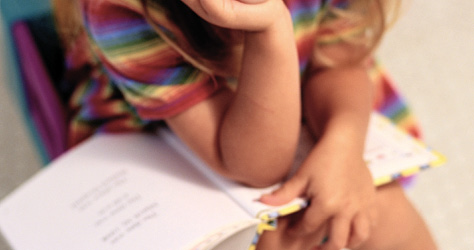Pre-schoolers learn by playing, not by sitting down with workbooks ploughing through the laws of phonics.
So while it’s tempting to give them a head start by buying lots of maths and literacy books, experts don’t advise it unless your pre-schooler is desperately keen.
At a glance
- They learn by playing
- Encourage them to read
- Writing is important too

Reading
Pushing too hard, too soon could accidentally switch off their natural enthusiasm because they get bored. Or if they find the whole thing too difficult they’ll feel a failure and be put off learning for years.
Giving them a love of books is far and away the most important thing at this age, say reading experts. Teaching them the mechanics of reading will come later: most pre-schools and nursery classes start with letter sounds half way through the year (when most of the class are four) and phonics will start in earnest in the first year of school (reception class).
The best tip is to read to them every day. Use loads of expression and silly voices to make it fun and get them to join in. With three and four-year-olds talk about the book as you read: can they guess the ending? Which was their favourite character? With four-year-olds, you could try following the words with your finger as you read, although this annoys some kids (in which case, stop – it’s more important they enjoy the story).
Reading books that rhyme, or singing nursery rhymes, is a great way to link word sounds; ask if they can hear how ‘dog’ and bog’ sound similar. Make up your own silly rhymes together.
Once they start linking sounds to letters (around four), you could buy some foam bath letters or magnetic letters. If they’re not that bothered about spelling out real words, get them to make up funny alien names and try to sound them out. It’s all about fun right now, so keep your tone light and don’t sound anxious. There’s plenty of time until their English GCSE.
Writing
A three-year-old is just about able to draw a wobbly looking circle, so it’s a bit early to think about writing. But as parents we can do lots to help them develop the right muscles in their hands (‘fine motor skills’) so they’re ready for writing in the first year of school aged four to five. These activities are brilliant for developing fine motor skills: cutting with (child-friendly) scissors, lacing or weaving string or wool through holes in cardboard, peeling and sticking stickers, squidging play dough and picking up small objects with ‘tweezers’ made out of a straw bent in half.
When you’re reading, show your pre-schooler how writing works – from left to right and how words have spaces in between them.
Maths
Counting stairs with your pre-schooler as you climb is a great way to learn numbers (although they may not understand what the numbers mean until a bit later; they might just be reciting them by rote). Many three-year-olds can count reliably to 10 or even 20; others may only manage up to 3. But there’s no rush. Teaching maths at this stage is best done through fun activities so they don’t even realise they are learning: helping you count and weigh ingredients when cooking, learning about patterns by putting their toys into shape or size groups or lining up green and purple grapes in alternate order. A good game for practising counting is opening up your own play shop and putting prices on the items you’re ‘selling’. You can also sing rhymes like ‘Ten in the Bed’ which is basically a lesson in subtraction! Playing games with dice is good for learning to relate written numbers (the dots) to real counting.
The really important skills
If you ask any pre-school or reception class teacher what they think parents should be teaching their pre-schoolers, they may mention a love of books and basic counting – but probably nothing else we’ve listed above! They’d like us to teach them to concentrate for a few minutes, to be able to sit still and listen to an adult, to have good language skills and to be able to look after themselves – use a knife and fork for meals, go to the loo on their own and do up their own coats. (So that’s taught us!)
EXPERT QUOTE
"We must not push kids beyond what they are capable of and what they are happy with. If they get put off learning so young, it's going to be very difficult to turn that situation around later. They have got to have time to be little children."
Child psychologist Dr. Valerie Muter, co-author of Prepare Your Child for School
See here for more tips on getting pre-schoolers ready for school.